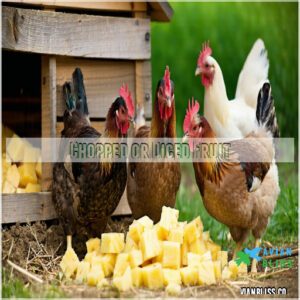This site is supported by our readers. We may earn a commission, at no cost to you, if you purchase through links.

Good news, Chickens can absolutely eat pineapple, but you’ll want to follow a few key guidelines.
Slice it up into bite-sized pieces, ditch the tough skin and core, and serve it fresh or frozen as an occasional snack.
Packed with vitamin C, manganese, and bromelain, pineapple offers a nutritional boost that can support your flock’s immune system and overall health.
Just remember – moderation is essential, don’t go overboard, and always introduce new foods gradually.
Your chickens will cluck with delight at this sweet, enzyme-rich treat that’s more than just a tasty morsel.
Table Of Contents
- Key Takeaways
- Pineapple Nutrition Benefits
- Can Chickens Eat Pineapple
- Feeding Pineapple Safely
- Pineapple Health Benefits
- Potential Risks and Precautions
- Serving Pineapple to Chickens
- Frequently Asked Questions (FAQs)
- Can I feed chickens raw pineapple?
- Are any fruits poisonous to chickens?
- Can birds eat pineapple skin?
- What fruit do chickens love?
- What shouldn’t you feed chickens?
- Can baby chicks eat pineapple safely?
- Does pineapple affect egg laying or taste?
- Should pineapple be mixed with other fruits?
- Can chickens eat canned pineapple products?
- Will pineapple attract pests to chicken coops?
- Conclusion
Key Takeaways
- Chickens can eat pineapple, but stick to the juicy flesh and avoid the skin, core, and canned versions.
- Feed pineapple in moderation to prevent digestive issues and always introduce it gradually to monitor reactions.
- Pineapple provides health benefits like boosting immunity, aiding digestion, and improving bone health with its vitamins, minerals, and enzymes.
- Always serve fresh or frozen pineapple in small, bite-sized pieces and clean up leftovers to avoid attracting pests.
Pineapple Nutrition Benefits
Pineapple is packed with vitamins, minerals, and antioxidants that can support your chickens’ health in surprising ways.
From boosting their immunity to aiding digestion, this tropical treat has plenty to offer when fed in moderation.
Vitamin C Content
Vitamin C in pineapple is like a health superhero for your chickens.
It strengthens their immune system, helps them handle heat stress, and improves overall health.
While chickens don’t need daily vitamin C intake like humans, the nutrient value of pineapple makes it a great occasional boost.
The immune boost alone makes the benefits of pineapple for chickens worth considering.
For more information on feeding pineapple, check the chicken diet guide to confirm a balanced diet.
Mineral Composition
Speaking of health perks, pineapple’s mineral balance is another win for chickens.
It’s got manganese for metabolism, calcium for stronger bones, and potassium to keep their energy humming.
Plus, magnesium, phosphorus, and zinc support overall dietary needs.
- Manganese: Metabolism and eggshell quality
- Calcium: Bone health
- Potassium: Electrolyte balance
- Magnesium: Nervous system support
- Phosphorus: Cell repair and growth
Bromelain Enzyme
Bromelain, a powerful enzyme in pineapple, works wonders as a digestive aid for chickens.
It helps with protein breakdown, enhancing nutrient absorption and fueling important biochemical reactions in their bodies.
While bromelain offers enzyme benefits, moderation is key—pineapple toxicity in chickens is a risk if overfed.
Curious if chickens eat pineapple safely? Yep, but keep those portions small to ensure a safe and digestive aid.
Antioxidant Properties
Did you know pineapple and chickens make a surprising duo?
Its antioxidants, like vitamin C, work wonders by fighting oxidative stress and supporting cellular health.
Think of it as free radical protection for birds!
These health benefits also boost nutrient absorption, giving their immune systems extra power.
Forget expensive antioxidant supplements—pineapple delivers a tasty, natural option for your flock!
Can Chickens Eat Pineapple
Yes, chickens can eat pineapple, but it’s more of a treat than a staple.
The sweet, juicy flesh is great for poultry nutrition, but skip the skin, crown, and core.
Wondering if pineapple is safe for chickens? It is, as long as you:
- Avoid overfeeding to protect their digestive health.
- Introduce it slowly to watch for a pineapple allergy.
- Add fruit variety to their treats to keep them intrigued.
- Offer only ripe pieces—no unripe or canned ones.
When considering treats like pineapple, understanding chicken diet basics is vital for their overall health.
Moderation’s key—too much isn’t good for anybody!
Feeding Pineapple Safely
When feeding pineapple to your chickens, you’ve got to keep it safe and simple.
Remove the tough skin and core, stick to fresh or frozen pieces, and toss anything moldy or rotten.
Removing Skin and Core
When prepping pineapple for your flock, ditch the tough skin and fibrous core—chickens can’t handle those.
Wondering, “Can chickens eat pineapple skin or core?” Nope, stick to the juicy flesh.
Many other fruits and vegetables are safe for chickens, according to this comprehensive chicken diet guide.
Chop it into small, bite-sized pieces for easy munching. Think of it as pineapple trimming 101: peel, slice, and serve the good stuff.
Your chickens will thank you!
Serving Fresh or Frozen
When feeding chickens pineapple, fresh fruit serving or frozen treat options work great.
Fresh chunks are easy to peck at, while frozen pieces can cool them on hot days.
Here’s how to do it:
- Chop small portions to avoid waste.
- Use frozen pineapple sparingly to prevent brain freeze.
- Monitor their reaction—not all chickens love it!
Buying fresh pineapple products can be a convenient alternative to fresh fruit.
Avoiding Moldy or Rotten Fruit
Rotten pineapple is a no-go for your feathered friends.
Chickens deserve fresh, high-quality treats that won’t upset their delicate digestive systems.
Check your fruit thoroughly before serving.
When it comes to identifying spoilage, there are several signs to look out for.
| Spoilage Sign | What to Look For |
|---|---|
| Mold | Fuzzy patches, discoloration |
| Smell | Sour or fermented odor |
| Texture | Mushy, soft spots |
| Color | Dark brown or black areas |
When in doubt, toss it out to ensure you’re providing your chickens with the best possible treats.
Pineapple Health Benefits
Wondering how pineapple can boost your chicken’s health? Get ready to discover the incredible benefits of this tropical treat that’ll help your feathered friends stay strong and vibrant.
Boosting Immunity
Bolstering your chickens’ natural defenses starts with smart snacking.
Pineapple’s powerhouse of Vitamin C delivers an immune support punch that helps chickens fight off potential threats.
By adding these sweet, tangy chunks to their diet, you’re giving their immune system a natural boost that can help prevent diseases and keep your flock feeling strong and resilient with immune support.
Improving Bone Health
As your chickens fight off nasty bugs, they’re also building rock-solid bones thanks to pineapple’s mineral magic.
The manganese and phosphorus in this tropical treat work overtime to strengthen their skeleton.
Toss them a few chunks, and you’ll be supporting their healthy joints and bone density without breaking a sweat.
Who knew fruit could be such a powerhouse?
Aiding Digestion
Your flock’s digestive journey gets a tasty boost with pineapple’s bromelain enzyme.
These tropical treats help break down proteins, supporting gut health and improving nutrient absorption.
By introducing small chunks of fresh pineapple, you’ll help your chickens process food more efficiently, keeping their stomachs happy and digestion smooth without overwhelming their delicate systems, which is crucial for maintaining gut health and overall well-being with the help of pineapple.
Treating Respiratory Issues
After supporting your chickens’ digestive health, pineapple’s magic continues with respiratory relief.
Its powerful bromelain and vitamin C can help clear airways and boost lung function.
By reducing mucus and supporting breathing ease, this tropical treat offers more than just a tasty snack.
- Break free from respiratory struggles
- Breathe easier with nature’s remedy
- Harness your chickens’ natural healing power
- Combat respiratory challenges naturally
- Empower your flock’s immune defense
Potential Risks and Precautions
When treating your chickens to pineapple, you’ll want to keep a watchful eye on potential risks that could turn a sweet snack into a health hiccup.
Don’t let your feathered friends overindulge, as too much of this tropical treat can lead to digestive troubles and unexpected reactions that might ruffle their feathers, which could be a significant health hiccup.
Overfeeding and Digestive Issues
Keep an eye out for stomach problems when treating your chickens to pineapple.
Too much of this sweet fruit can trigger digestive health nightmares – we’re talking diarrhea and gut inflammation that’ll make your feathered friends miserable.
Moderation is key, so resist the urge to overfeed and watch their reaction closely, as a little pineapple goes a long way.
Allergic Reactions and Sensitivities
While digestive problems can throw a wrench in your chicken-feeding plans, allergic reactions pose another potential hurdle.
Watch for these warning signs of pineapple sensitivity:
- Skin irritation or unexpected rash
- Sudden changes in breathing patterns
- Unusual lethargy or reduced activity levels
Identifying and preventing allergic reactions early keeps your feathered friends healthy and happy.
Quick observation can stop minor issues from becoming major health concerns, which is key to maintaining healthy chickens.
Avoiding Canned or Unripe Pineapple
When allergic reactions pop up, your chicken’s pineapple journey takes a twist.
Not all pineapples are created equal! Check out this quick guide:
| Ripe Pineapple | Unripe Pineapple | Canned Pineapple |
|---|---|---|
| Safe & Sweet | Too Acidic | Dangerous Sugars |
| Good Treat | Tough Texture | Preservative Risks |
| Soft Flesh | Digestive Trouble | Not Recommended |
Stick to fresh, ripe fruit to keep your feathered friends healthy and happy.
Monitoring for Adverse Effects
When introducing pineapple to your chickens, vigilance becomes your best friend in preventing potential health hiccups.
Watch for symptoms like diarrhea, lethargy, or unusual behavior that might signal digestive issues or adverse reactions.
If you spot any toxicity signs—decreased appetite, weakness, or persistent stomach irritation—stop feeding pineapple immediately and consult a veterinarian.
Monitoring bird health checks is essential for early detection of potential issues in your flock.
Serving Pineapple to Chickens
In the case of serving pineapple to your chickens, you’ll want to slice the fruit into small, manageable chunks that are easy for them to peck and enjoy.
Remember to remove the tough skin and core, and offer this sweet treat sparingly to keep your feathered friends healthy and happy.
Chopped or Diced Fruit
After addressing potential risks, let’s slice up some pineapple wisdom.
Chop the fruit into small, bite-sized chunks that won’t overwhelm your feathered friends.
Thin, manageable pieces make it easier for chickens to peck and enjoy.
Pro tip: Cut the fruit into quarter-inch bits to prevent choking and guarantee safe, fun snacking for your backyard buddies.
Providing homemade bird food can be a great way to attract various bird species to your yard, creating a diverse and thriving ecosystem with safe snacking and fun experiences for your backyard buddies.
Frozen or Dried Treats
Every chicken keeper’s secret weapon might just be frozen or dehydrated pineapple treats.
These cool snacks can be a game-changer for your feathered friends, offering an invigorating twist on traditional chicken treats.
Freeze-dried or frozen pineapple chunks provide a crunchy, nutritious option that’ll have your chickens clucking with joy, while keeping things safe and interesting.
Many online retailers offer convenient access to dried pineapple products that can be used to create these invigorating twist on traditional chicken treats, making them a great addition to your chicken’s diet with dried pineapple products.
Mixing With Other Foods
Just pulled out those frozen pineapple treats? Now’s your chance to jazz up your chicken’s menu.
When mixing fruits, think variety and moderation. Your feathered friends will thank you for a flavor-packed plate that keeps things interesting.
- Combine pineapple with berries for a nutrient punch
- Toss in grapes for sweet variety
- Add apple chunks for crunch
- Mix with peaches for tropical vibes
- Sprinkle melon for hydration boost
Healthy food pairing is an art – master it!
Providing Fresh Water and Balanced Diet
Don’t let pineapple treats throw your chickens’ diet off track.
Always prioritize fresh water and high-quality feed as their primary nutrition source.
Pineapple should be a rare, small-portion treat that complements—not replaces—their balanced diet.
Maintain dietary variety, ensuring water quality and nutrient balance remain top priorities for your flock’s healthy hydration.
Frequently Asked Questions (FAQs)
Can I feed chickens raw pineapple?
You can feed chickens raw pineapple in moderation.
Cut into small chunks, remove the skin, and offer as an occasional treat.
Watch for digestive reactions and limit to 1-2 pieces per bird to keep your feathered friends healthy.
Are any fruits poisonous to chickens?
Hold onto your feathers.
Some fruits can spell disaster for your backyard buddies.
Avocado, cherry pits, rhubarb leaves, and unripe tomatoes pack serious toxins that’ll send your chickens to the vet faster than you can say "cluck.
This reorganization aims to maintain the original flow and content while enhancing readability by separating the introductory warning from the list of problematic fruits.
Can birds eat pineapple skin?
Pineapple skin isn’t safe for birds.
It’s tough, spiky, and hard to digest—basically a no-go.
Stick to the juicy flesh instead.
Your feathered friends will thank you for keeping things easy on their tummies!
What fruit do chickens love?
Imagine a buffet of berries, melons, and apples—chickens go wild for these!
Blueberries are a favorite, watermelon keeps them hydrated, and apples (without seeds) are like candy.
Toss some out and watch the frenzy!
What shouldn’t you feed chickens?
Don’t give chickens chocolate, avocado, raw beans, salty snacks, or moldy food.
These can be toxic or harmful.
Skip anything overly processed or sugary too—stick to natural treats and they’ll cluck with joy!
Can baby chicks eat pineapple safely?
Baby chicks shouldn’t eat pineapple yet—it’s too acidic for their tiny tummies.
Stick to starter feed and softer treats until they’re older.
Think of it like skipping dessert until after dinner!
Does pineapple affect egg laying or taste?
Don’t worry, pineapple won’t mess with egg taste or laying if given sparingly.
Its nutrients might even boost egg quality.
Just don’t overdo it—too much sugar can throw their health off balance.
Should pineapple be mixed with other fruits?
Mixing pineapple with other fruits like berries or melon can work, but keep portions small.
It’s like a fruit salad for chickens—fun, but too much sugar or acid can upset their tummies.
Can chickens eat canned pineapple products?
Canned pineapple isn’t the best choice for chickens.
It’s loaded with added sugars and preservatives that can upset their digestion.
Stick to fresh pineapple instead—it’s healthier and way more chicken-friendly.
Your flock will thank you!
Will pineapple attract pests to chicken coops?
Leaving pineapple scraps in the coop is like rolling out the red carpet for ants, flies, and rodents.
Always clean up leftovers quickly to keep pests at bay and your chickens’ space pest-free.
Conclusion
Think of pineapple as a little tropical vacation for your chickens.
Yes, chickens can eat pineapple, and it’s a fun, healthy treat when served the right way.
Just remember to remove the tough skin and core, chop it into manageable pieces, and keep portions small.
Pineapple’s nutrients can boost their health, but overdoing it might upset their digestion.
Stick to fresh or frozen fruit, and watch your flock enjoy this sweet snack without a worry!













